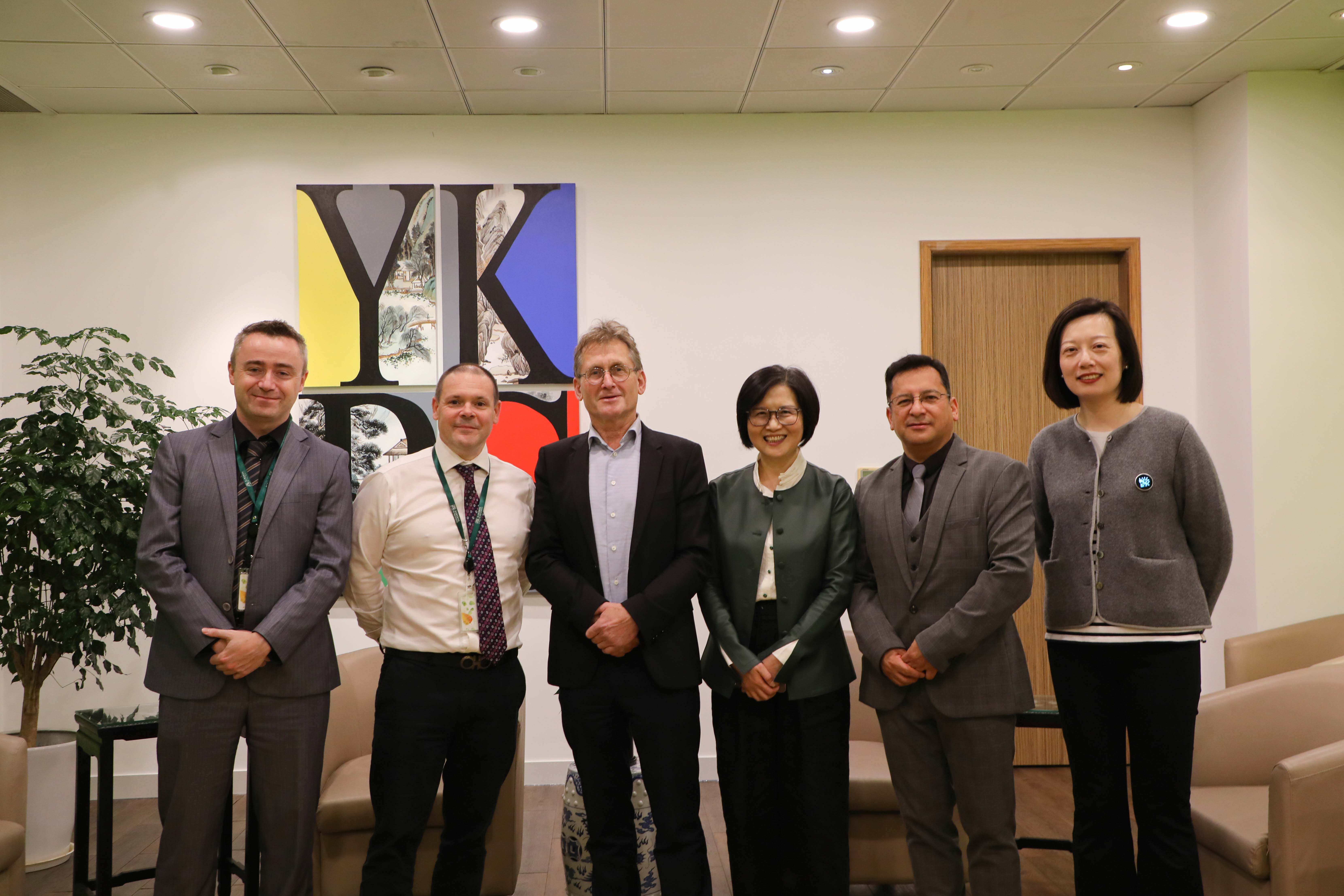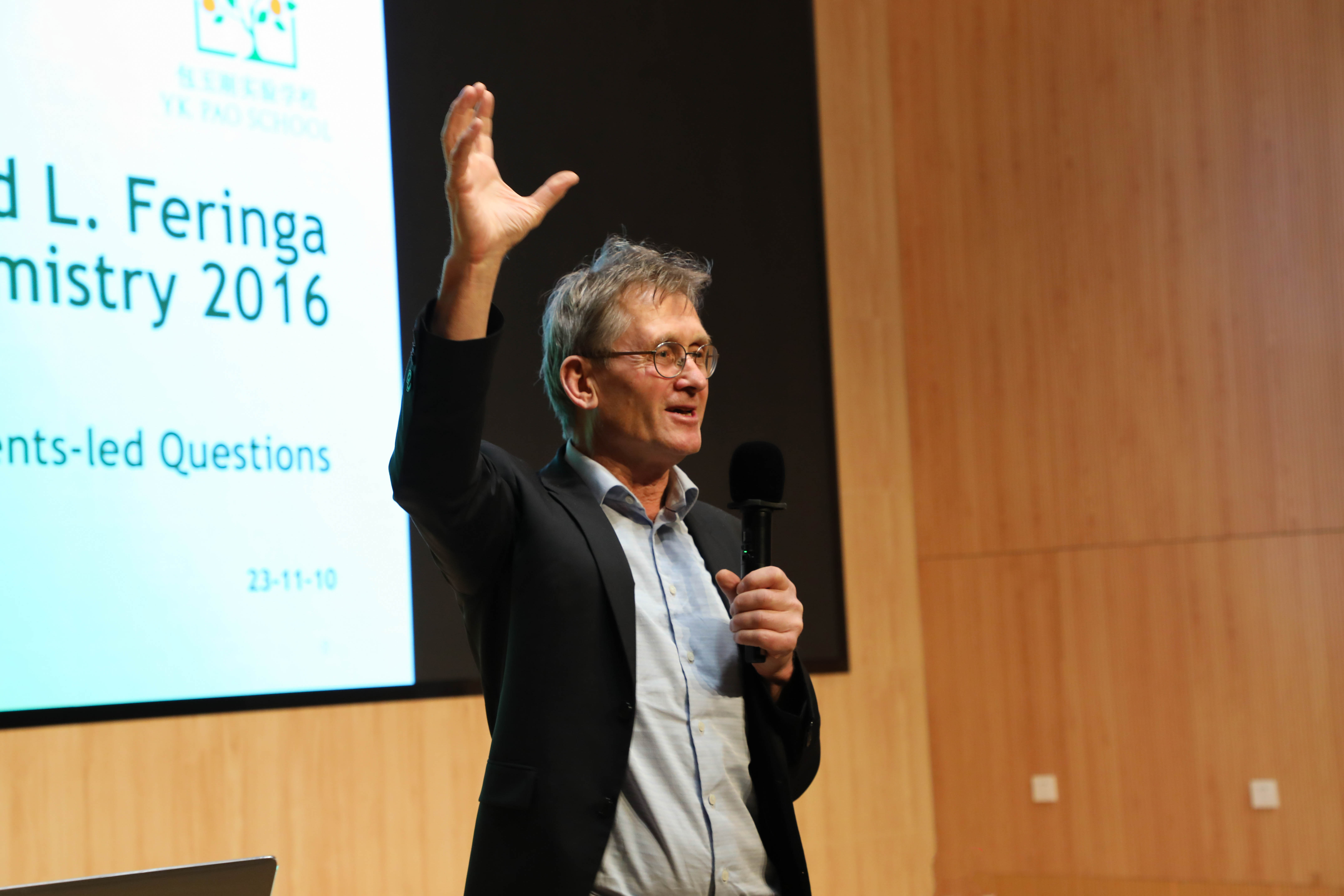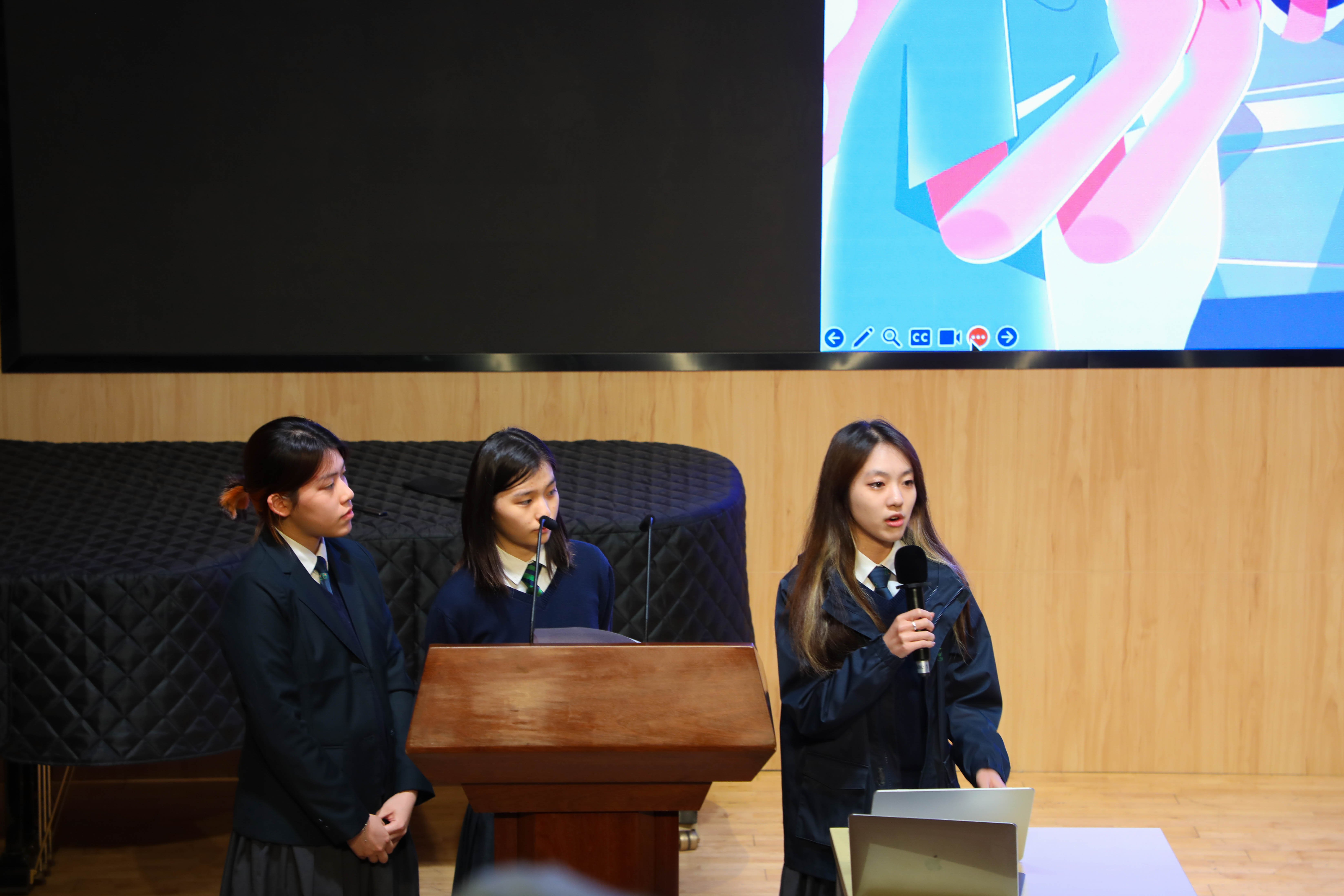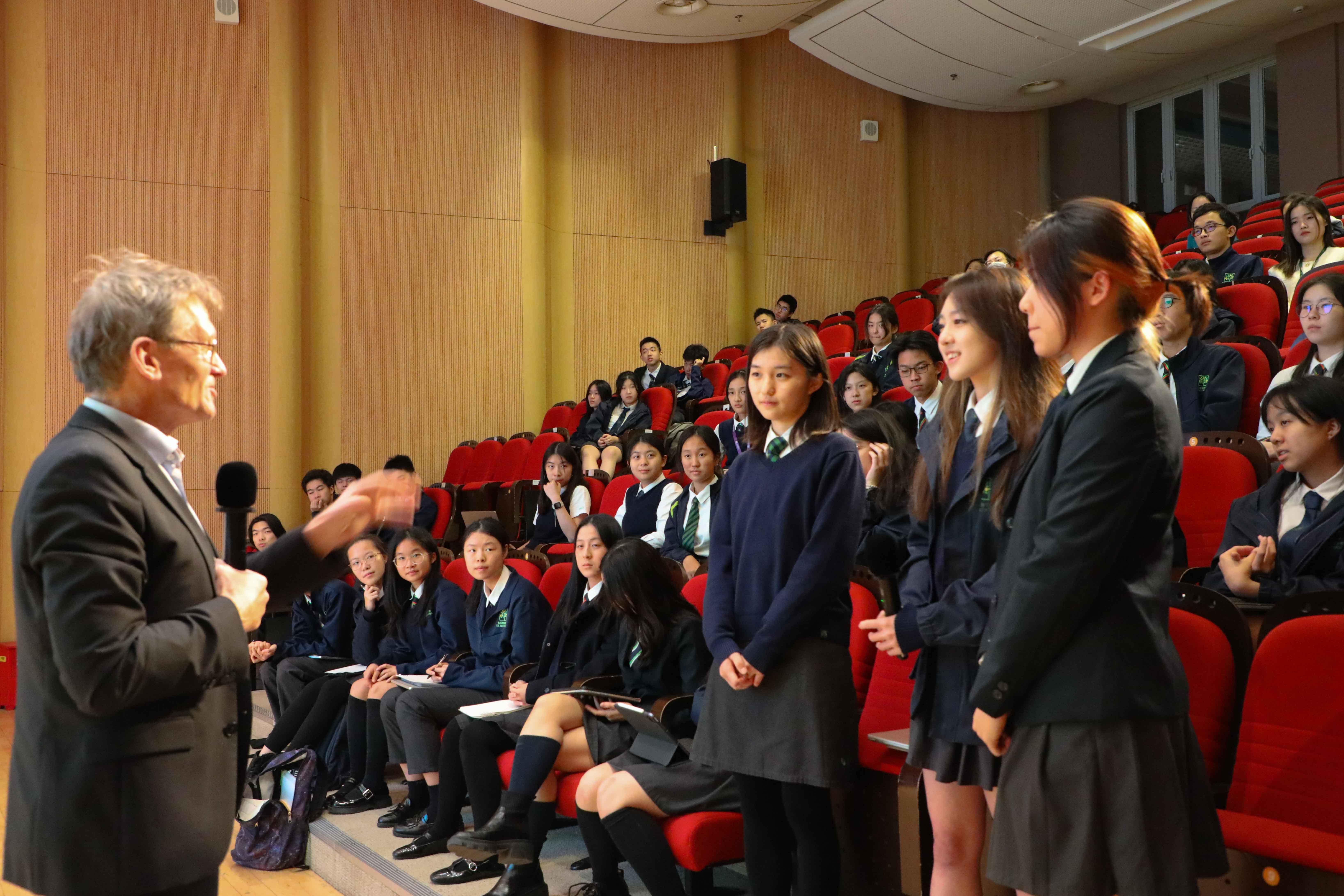Follow your dreams, curiosity. You are all highly talented, use your talent and be curious because there’s so much to learn.
-- Professor Bernard Feringa
2016 Nobel Laureate in Chemistry

On November 10, the Pao School Songjiang Campus was honored to welcome Professor Bernard Lucas Feringa, a Nobel Laureate. Professor Feringa is a Dutch synthetic organic chemist, specializing in molecular nanotechnology and homogeneous catalysis. He was awarded the 2016 Nobel Prize in Chemistry, together with Sir J. Fraser Stoddart and Jean-Pierre Sauvage, "for the design and synthesis of molecular machines." He is a member of many scientific societies, a foreign member of the Chinese Academy of Sciences, a foreign member of the American Academy of Arts and Sciences, a member of the Royal Netherlands Academy of Arts and Sciences, a member of the European Academy of Sciences, and a foreign member of the National Academy of Sciences of the United States. He is also the Jacobus van't Hoff Distinguished Professor of Molecular Sciences, at the Stratingh Institute for Chemistry, University of Groningen, Netherlands.

After an introduction by Dr Alex Aristizabal, Director of High School Teaching and Learning, three Y12 students, Susie, Mary, and Sissi, discussed their scientific research conducted at the ECUST Feringa Nobel Prize Centre. Their research over the past two years focused on a molecule called spermidine, which they found has potential in improving food safety and cancer testing. Through experiments, they also explored a molecule to quickly detect spermidine levels in food, as well as a material with anti-counterfeiting potential.
After the presentation of this work, Professor Feringa offered the students advice on future research and encouraged them to continue making a difference through science. He also noted that unexpected scientific discoveries can often lead to exciting and beneficial outcomes.

The team is part of the ‘Feringa-Pao School Young Elite Chemist Programme’ which was co-organised by the East China University of Science and Technology (ECUST) Feringa Nobel Prize Centre and Pao School High School Science Department. The three students said their research experience in the labs had taught them more than just the value of reading literature, writing reports, and clearly presenting findings. Through their research, they have discovered the importance of perseverance and curiosity, and have gained a better understanding of Professor Feringa's contribution to the world.
Chemistry research extends beyond mere words on paper; it represents a tangible, transformative discipline capable of shaping humanity and the world, one test tube at a time.
—— Y12 Susie, Mary, and Sissi
The cooperation between the high school and Professor Feringa has a deep history. As early as 2020, the High School Science Department and the Bernard L. Feringa Nobel Prize Scientists Joint Research Centre of East China University of Science and Technology (ECUST Feringa Nobel Prize Centre) jointly launched the ‘Feringa-Pao School Young Elite Chemist Programme.’ The programme includes a series of extended courses that drew on the center’s research expertise and Pao School’s chemistry curriculum; individual research projects in ECUST's laboratory; and regular lectures by visiting scholars. In 2020, Professor Mei Ju delivered a presentation of the Feringa Nobel Prize Research Centre’s work in the field of precision chemistry and molecular engineering. She also discussed the centre’s important breakthrough in precision controllable smart materials and precision probes used in the early detection of malignant tumors and Alzheimer’s disease.

Afterwards, Professor Feringa addressed an array of pre-prepared questions from the students, shedding light on his personal journey of growth, the transformative impact the Nobel award has had on his life, and the importance of teamwork in achieving one's goals. He encouraged young scientists to work hard but also work smart. Additionally, he urged students to nurture an unwavering sense of curiosity and to persistently pursue their dreams.

What made you choose to pursue chemistry?
That's a very interesting question. You know, I grew up as a kid on a farm in a fairly remote, small village in the north of Netherlands, close to the German border. And I found it fantastic. But I'd never heard about chemistry. I saw a lot of nature, plants and animals growing, all these things, with their beautiful colours. Then I arrived in high school, and learnt you can do experiments to make colours. Our teacher encouraged us to do a lot of experiments and not get too stuck in the theory, so I was excited about physics and mathematics as well, but especially chemistry. Chemistry let you make things.
I had a really inspiring teacher. Chemistry was exciting because of the experiment you could do, where you could design your own experience with your hands, you know? So I want to give credit to teachers, because they open windows onto the future, for your future, for the young people. My chemistry teacher made me so excited we would continue even after the class, in our free time, we were still able to do experiments. There was always more to discover.
What message would you, as a Nobel laureate in Chemistry, like to convey to our students to inspire and nurture their curiosity, encouraging them to explore new frontiers in scientific research in a globalized society?
Yes, the true key is curiosity. I think this is the most important message in everything that I’ve said: Follow your dreams, curiosity. You are all highly talented. Use your talent and be curious because there’s so much to learn. Yes, you can do marvelous things and of course you will probably later have different jobs, different opportunities, all over the world. Still, the most important thing is that you are curious and you want to learn. It's nice to get diplomas. Congratulations. But curiosity is the most important thing.
You have to study all your life. I have never stopped studying, and learning. And so curiosity is really important. Always learning something new. Curiosity is what encourages you to explore and to keep learning. Be eager for new experiences. If you get an opportunity to go to another place, to a different environment, perhaps abroad, do that. In my group I have people from 13 different countries, from Canada, America, Germany, Italy and Germany, from many different countries.
I came from a fairly small village and I tell you, I was a bit nervous and scared when I saw the wider world for the first time. I had to go to Amsterdam which, as you know, is not as big as Shanghai. But I was in a city for the first time, and it was quite an experience coming from a small village, but it was a great experience,
Take advantage of the fact that you can learn, that you can discover, that you can follow your dreams, and don't be afraid of opportunities. Take advantage of these kind of opportunities. And also listen to your teacher because they might give you wise advice and say, Oh, this would be really great thing to do. Follow your dreams, with all my best wishes.